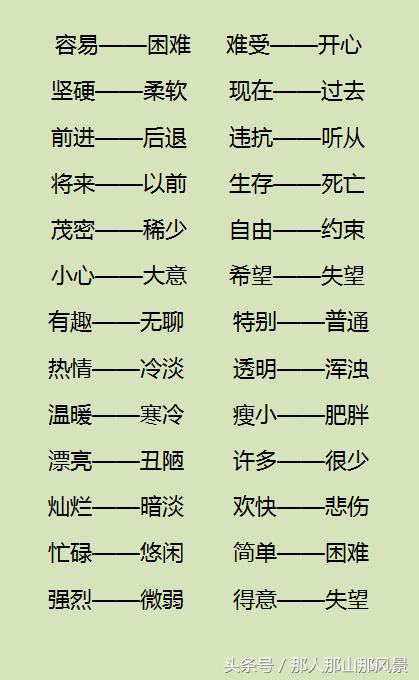1.Can you help me think of an invention?你能帮我想一个发明吗?(1)think of想起(2)Can you do sth.?你能做什么吗?该句型表示客气地请求某人做某事,肯定回答常用:Sure,I’d like/love to.或With pleasure.否定回答常用:Sorry,I can’t.../I’m sorry, but...,今天小编就来聊一聊关于九年级上册英语人教u5句子?接下来我们就一起去研究一下吧!

九年级上册英语人教u5句子
1.Can you help me think of an invention?你能帮我想一个发明吗?(1)think of想起(2)Can you do sth.?你能做什么吗?该句型表示客气地请求某人做某事,肯定回答常用:Sure,I’d like/love to.或With pleasure.否定回答常用:Sorry,I can’t.../I’m sorry, but...
2.With pleasure!乐意效劳!常表示乐于接受或同意某事。
3.Is it really such a great invention?它真是如此了不起的一项发明吗?(1)such a/an 形容词 可数名词单数,如此......的一个......=so 形容词 a/an 可数名词单数。如,She is such a clever girl.=She is so clever a girl.(2)such 形容词 可数名词复数/不可数名词,如此......的......。如,There are such beautiful flowers./It is such fine weather.
4.Think about how often it’s used in our daily lives.想想它在我们的日常生活中多么频繁地被使用吧。(1)think about考虑(2)in our daily lives在我们的日常生活中
5.You do seem to have a point...看来你说的确实有道理......(1)seem看起来;好像,系动词,后接形容词或动词不定式。如,She seems happy today.=She seems to be happy today.(2)have a point有道理
6.For example, it mentioned that the zipper was invented by Whitcomb Judson in 1893.例如,它提到拉链是由惠特科姆·贾德森在1893 年发明的。(1)for example例如(2)mention提到;说到,动词。后面可接名词、代词、动词ing形式或that从句。mention sth.to sb.向某人提及某事
7.It is said that a Chinese ruler called Shen Nong was the first to discover tea as a drink.据说一位号称神农的中国统治者最早发现了茶可以饮用。(1)It is said that...据说......;有人说......(2)be the first to do sth.第一个做某事
8.Some leaves from a tea plant fell into the water and remained there for some time.一些叶子从茶树上落入水中并在里面停留了一段时间。(1)fall into落入;陷入(2)remain 保持不变;仍然是,后接形容词、名词、分词或介词短语作表语。(3)some time一段时间
9.It produced a nice smell so he tasted the brown water.它散发出一种香味,所以他尝了尝这种褐色的水。(1)smell气味,名词。smell闻起来;发出......的气味,动词,后接形容词。(2)taste品尝,动词。味道;品味,名词。有......的味道,系动词,后接形容词。
10.One of the world’s favorite drinks was invented.世界上最受欢迎的饮品之一被发明了。(1)one of 复数名词/代词宾格形式,......之一,作主语时谓语动词用单数形式。
11.The book describes how tea plants were grown and used to make tea.这本书描述了如何种植茶树和泡茶。(1)be used to do sth.被用来做......(2)make tea泡茶
12.It is believed that tea was brought to Korea and Japan during the 6th and 7th centuries.人们认为茶在6世纪到7世纪期间被带到了朝鲜和日本。(1)It is believed that...人们认为......
13.In England, tea didn’t appear until around 1660, but in less than 100 years, it had become the national drink.在英国,直到1660年左右,茶才出现,但是在不到100年的时间里,它成了全国性的饮品。(1)less than少于
14.The tea trade from China to Western countries took place in the 19th century.从中国到西方国家的茶叶贸易出现在19世纪。(1)from ...to...从......到......(2)take place发生(3)in the nineteenth century在十九世纪
15.This helped to spread the popularity of tea and the tea plant to more places around the world.这帮助了茶和茶树传播到世界上更多的地方。(1)help帮助,动词。help do/to do sth.帮助做某事(2)popularity 受欢迎;普及,名词。the popularity of ... ......的普及(3)around the world全世界
16.Even though many people now how about tea culture, the Chinese are without doubt the ones who best understand the nature of tea.尽管现在很多人了解茶文化,但是毫无疑问中国人才是最懂得茶的本质的人。(1)even though=even if即使,引导让步状语从句(2)doubt疑惑;疑问,名词。without doubt毫无疑问;的确。no doubt无疑;确实地。doubt about...关于......的疑惑
17.The fridge was sold at a low price.冰箱被以低价出售了。(1)at a low price以低价
18.Somebody stole my camera from my hotel room.有人从我的旅馆房间里偷了我的照相机。(1)steal ...from...从......偷......
19.Different writers translated the book into different languages.不同的作家把这本书翻译成了不同的语言。(1)translate...into...把......翻译成......
20.The earthquake happened all of a sudden, nut luckily the villagers were brought to a safe place.地震突然发生了, 但是幸运的是村民们被带到了一个安全的地方。(1)all of a sudden突然;猛地
,




